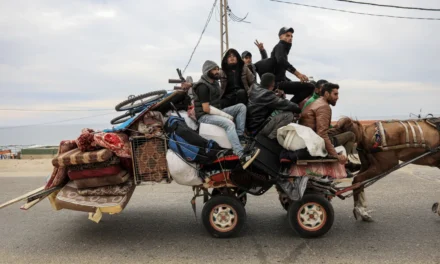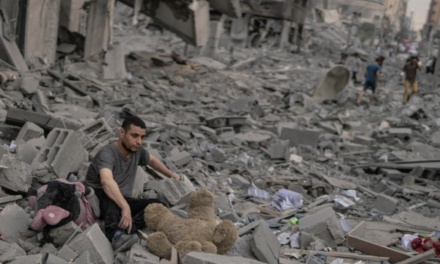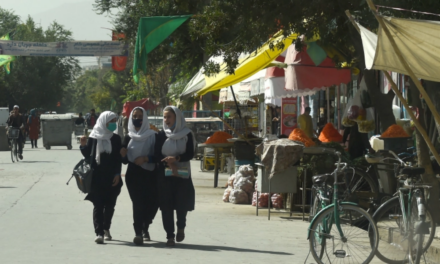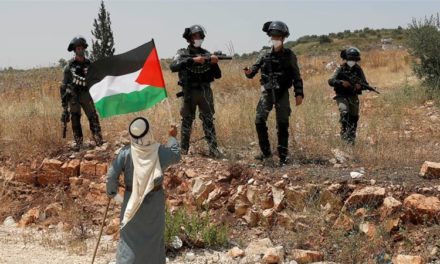Ramallah, Occupied West Bank – On October 22, Israel designated six prominent civil society and human rights groups in Palestine as “terrorist” organisations.
The designation was widely condemned by the international community and rights groups as “unjustified” and “baseless”.
Five of the organisations are Palestinian: Addameer Prisoners’ Rights group; Al-Haq rights group; the Union of Palestinian Women Committees (UPWC); the Union of Agricultural Work Committees (UAWC); and the Bisan Center for Research and Development.
The sixth is the Palestine chapter of the Geneva-based Defence for Children International organisation.
Some of the organisations conduct critical human rights work – including documenting Israeli human rights abuses, providing legal aid to detainees, conducting local and international advocacy, and working with the International Criminal Court (ICC) and the United Nations.
Others, such as the UAWC, provide hands-on aid to Palestinians, including by rehabilitating land at risk of confiscation and helping tens of thousands of farmers in Area C – the more than 60 percent of the occupied West Bank under direct Israeli military control, and where all illegal Israeli settlements and settlement infrastructure are located.
Civil society organisations, which obtain most of their funding from donor states, are a key pillar in the social and economic development of Palestinians living in the 1967-occupied territories.
Israel’s October 22 move came under the pretext that these groups are affiliated with the left-wing Popular Front for the Liberation of Palestine (PFLP), claiming they “constitute an arm of the [PFLP] leadership, the main activity of which is the liberation of Palestine and destruction of Israel”. The PFLP’s armed wing was active as an organised body during the Second Intifada, and carried out attacks against Israeli targets.
No evidence was provided by the Israeli government to substantiate its claims surrounding the six organisations.
The designation “authorises Israeli authorities to close their offices, seize their assets and arrest and jail their staff members, and it prohibits funding or even publicly expressing support for their activities,” according to a statement by rights groups Human Rights Watch and Amnesty International.
Members of designated “terrorist” organisations can be criminally charged for their membership in or affiliation with the group.
On Tuesday, the UN High Commissioner for Human Rights Michelle Bachelet described the decision as an “attack on human rights defenders, on freedoms of association, opinion and expression and on the right to public participation, and should be immediately revoked”.
“Counter-terrorism legislation must not be applied to legitimate human rights and humanitarian work,” Bachelet said, adding that the groups “face far-reaching consequences as a result of this arbitrary decision, as do the people who fund them and work with them.”
In a statement on Wednesday signed by more than 250 local, regional, and international rights groups, the signatories said the Israeli move “comes in the context of the continuation of the occupation and apartheid state’s attacks on the rights of the Palestinian people, especially their right to struggle, in all forms, for freedom, return, self-determination, and building their independent Palestinian state”.
Defamation and defunding campaigns
Some of the targeted groups have said the “terrorist” designation is the latest part of Israel’s longstanding efforts to stifle the work and voices of Palestinian civil society organisations and rights groups.
Since 1967, Israel has banned more than 400 local and international organisations as being “hostile” or “unlawful”, including all major Palestinian political parties – with them the Palestinian Authority’s governing Fatah party, and the Palestine Liberation Organization (PLO), with which Israel signed the 1993 Oslo Accords.
Israeli authorities have also slapped these designations onto dozens of charities and media outlets in Palestine, and used them to raid their offices, issue orders to shut them down, to carry out arrests and detain people, and to regularly try people for work exercising basic civil rights and for criticising the Israeli occupation.
Such groups have long been the targets of smear, defamation, and defunding campaigns by Israeli and international lobby groups such as NGO Monitor and UK Lawyers for Israel, in cooperation with the Israeli government with which they have close ties.
Smear campaigns have also led to the further tightening of restrictions on funding by donor states amid “terrorism” and “anti-Semitism” claims.
In early 2020, the European Union (EU) announced additional “anti-terror” clauses for funding contracts provided to civil society organisations in Palestine, imposing stricter vetting and screening processes.
The Palestinian National Campaign to Reject Conditional Funding was formed on the heels of the development, condemning the decision as having “dramatic consequences as it lays the foundations for a system of generalised screening and vetting of the whole of Palestinian civil society”.
“These political conditions have crippled Palestinian civil society’s margin for action, disempowered the Palestinian people, and reinforced the political status quo, undermining Palestinian claims for their legitimate human rights,” the Badil Resource Center for Palestinian Residency and Refugee Rights, wrote in a position paper in April 2020.
Badil said that in the context of the post-9/11 era, “counterterrorism” legislation is now “wielded as a weapon to stifle Palestinian civil society and encroach on the scope of the Palestinian people’s legitimate rights”.
“The danger of this is that these laws are becoming international – they are trying, through this ‘war on terror’ that the US invented, to create all these restrictions,” Francis told Al Jazeera. “Israel used this law to corner these countries and to say, ‘I’m fighting with you, against terrorism.’”
In July 2020, the Dutch government announced it was suspending funding for the UAWC, one of the six targeted organisations, pending review.
And, earlier this month, Palestinians in the besieged Gaza Strip protested against a new two-year framework signed between the UN Refugee Agency for Palestine (UNRWA) and the US government, which introduced “anti-terror” clauses on funding, and provisions on monitoring school curriculums.
However, critics say the labelling of six organisations as “terrorist” entities is a dangerous escalation.
Dangerous escalation
While Israel enforced a severe military law and military courts system in the occupied West Bank, it used a domestic criminal law to criminalise the organisations listed on October 22.
“This is not legal. Israel has no authority to apply this law to the occupied West Bank,” said Francis.
In 2019, a derivative of the “anti-terror” law was issued as a military order for the occupied West Bank.
She said Israel’s use of domestic criminal law in this case is part of its strategy to instil fear in donors, and to go beyond the limitations of military law which could be dismissed by donors as simply an extension of occupation.
“This is about scaring donors and having a legal card against every international party that tries to keep us around or to support us financially,” Sahar Francis, director of Ramallah-based Addameer, told Al Jazeera.
“Now, Israel can sue any party that gives us money – that’s the goal,” she continued.
The 104-page “anti-terror law” was issued in June 2016 and includes provisions on financing “terrorism”. It sets out prison terms between five and 25 years for staff and members of designated organisations, provides for confiscation of assets, and closure of the organisation.
It also introduced new criminal offences such as public expression of support for “terror” organisations with between three to five years in prison.
At the time of its release, the legislation was described primarily as a threat to the 1.8 million Palestinians living inside Israel, but that it could threaten donations to humanitarian groups in the West Bank or Gaza by framing them as aiding “terror”.
Adalah, the main Palestinian legal defence group in Israel, said at the time the law “paints the political activities and expression of Arabs in Israel – including those of a social, humanitarian and charitable nature – with a hostile and war-like facade, reclassifying them as acts of terror”.
Francis said Israel use of the “anti-terror” law in its designations was the most drastic move yet, following years of pressure on Palestinian civil society.
“These organisations have been undergoing this attack for many years – it didn’t work for Israel, so they called us terrorists. And this way, they have the legal tools to force countries to comply.”














